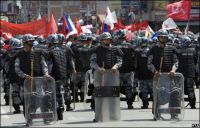Nepal: Narodziny republiki
| ...
|
|
Na pałacu królewskim w Kathmandu - stolicy Nepalu zawisła flaga państwowa bez emblematów królewskich. Nepal świętował pierwszy dzień republiki po obaleniu blisko 240-letniej monarchii. W Kathmandu doszło jednak do zamieszek. Rozruchy miały miejsce w centrum miasta, w sąsiedztwie pałacu królewskiego. Tłum, młodych przede wszystkim ludzi, agresywnie manifestował żądanie, by król Gyanendra opuścił niezwłocznie pałac królewski. Zgodnie z decyzją władz Nepalu ma na to 15 dni.
 |
| Sierp i młot, to emblemat wojujących z monarchią maoistów (AFP) |
Policja nepalska zaczęła rozpraszać manifestantów używając bambusowych pałek. Demonstranci odpowiedzieli kamieniami i cegłami. Doszło do starć w wyniku których kilkadziesiąt osób zostało rannych. Centrum miasta zostało sparaliżowane na kilka godzin. Komentatorzy w Nepalu wskazują, że proklamowanie republiki to dopiero początek długiej drogi tego kraju do stabilizacji. Ciągle bowiem brakuje ostatecznych uzgodnień politycznych na temat zakresu władzy prezydenta, relacji pomiędzy urzędem prezydenckim, a premierem, a także przyszłości maoistowskich oddziałów zbrojnych oraz młodzieżowej ligi komunistycznej związanej z maoistami. Partie polityczne nie uzgodniły także nadal kwestii podziału 26 mandatów, których rozdzielenie jest w gestii rządu. Jutro trwa w Nepalu święto z okazji proklamowania republiki.
Korespondent SwiatPodrozy.pl z Nepalu - Janaki Parajuli - donosi, że pałac rodziny królewskiej być może zostanie zamieniony w muzeum historyczne. Sama rodzina ma od tej pory być zrównana w przywilejach z innymi obywatelami kraju. Premier Nepalu Girija Prasad Koirala powiedział dziś, że taki dzień jak dzisiejszy "zdarza się raz w ciągu ery". Po 10-godzinnych obradach przedstawiciele nepalskich stronnictw politycznych przyjęli poprawkę do konstytucji przewidującą postawienie na czele państwa prezydenta. Jego uprawnienia nie są jeszcze sprecyzowane. Poniżej całość listu od Janaki`ego:
KATHMANDU, May 29 - Nepal has become a Federal Democratic Republic from today after the Constituent Assembly overwhelmingly voted for abolition of the country`s 240-year-old monarchy.
"I declare that the proposal tabled by the government for implementation of a republic has been passed as 560 members out of 564 present today voted in favor of the proposal and 4 against," announced meeting chairman Kul Bahadur Gurung after a division vote late Wednesday night. Only royalist Rastriya Prajatantra Party-Nepal members voted against the proposal.
Home Minister Krishna Prasad Sitaula tabled the proposal for a republic at Wednesday’s CA meeting. The proposal said, "Nepal has turned into an independent, indivisible, secular, inclusive, federal democratic republic with sovereignty and state authority vested in the people."
The proposal further said that the former king and royal family members shall no longer enjoy any rights and privileges other than those of common Nepali citizens.
The CA also instructed the government to make sure that Gyanendra Shah and his family leave Narayanhity Royal Palace within the next 15 days. The meeting instructed the government to make necessary arrangements for the safety of all property inside the palace. The government shall make all necessary arrangements for utilizing all the heritage inside the palace in the national interest including for setting up a historical museum.
The proposal states that all constitutional provisions, laws, administrative rules and arrangements at variance with the proposal have been scrapped. A second sitting of the CA passed a separate bill to amend the Interim Constitution and make new arrangements for a president as head of state. Through addition of part 4 (A) in the Interim Constitution, it says that the second meeting of the CA will provide for a president as head of state. The president will be supreme commander in chief of the army and will perform other duties as determined by the constitution. The president will mobilize the army upon the cabinet’s recommendation.
The president will remain in office until the CA promulgation of a new constitution. S/he will remain as patron of the constitution and will also abide by the constitution. The president can impose emergency rule upon recommendation of the cabinet. Two thirds of CA members can remove him/her from office through impeachment.
The amendment also provides for a vice-president. The parties, after more than 10 hours of negotiations ultimately agreed to amend the constitution and provide for a constitutional president but the presidents` powers and duties are yet to be finalized.
The meeting was convened about ten hours later than the scheduled time.
The parties, however, could not finalize the names of 26 members to be nominated by the cabinet. "Another bill will be presented in the near future to bring in other provisions on election procedures and the powers and duties of the president," Sitaula said.
The meeting also declared that Nepal will mark Jesth 15 (in the Nepali calendar) as Republic Day every year and extended tributes to the martyrs whose sacrifices have brought the country to the present stage.
Dream came true
Addressing the meeting before tabling the formal proposal for implementation of a republic, Prime Minister Girija Prasad Koirala said this was an epoch-making day in Nepal’s history. He said his past remark—that a day comes once in an era — came true the moment Nepal entered a republican phase. "The dream of the Nepali people has come true today," the 84-year-old Koirala said at the meeting.
Koirala said one of his biggest responsibilities was now over but another huge responsibility had come upon the shoulders of CA members, a responsibility towards the martyrs, orphans and widows who made their sacrifice for a stable, peaceful, democratic and prosperous Nepal.
"We have arrived at this stage only after removing several hurdles, so what we have achieved today is Nepal`s greatest asset," said Koirala. "So we should preserve and work together not only until a new constitution is framed but also until there is a complete transformation of the country into a fully democratic country."
Źródło: IAR / informacja własna
|
